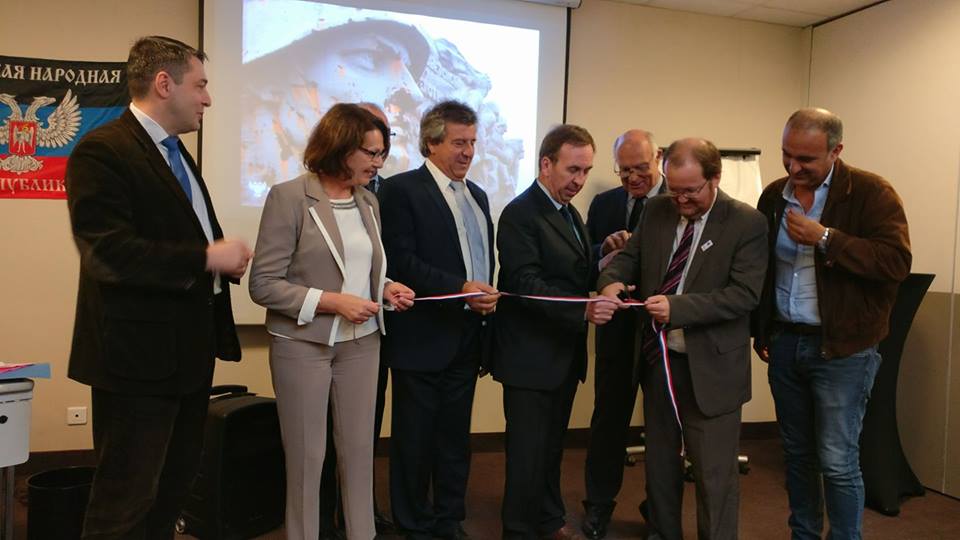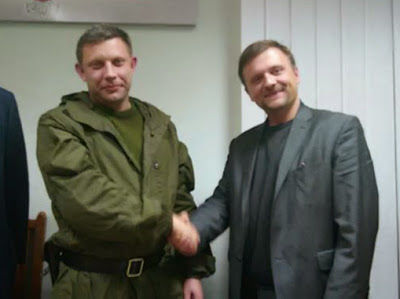How Vladimir Putin has become an example to European right-wing radicals
By Roman Hobryk

“Putin is an honest and resolute leader and is to be respected. At this stage, I don’t know if he is going to be our best friend or our worst enemy. But I’d prefer not to see him among our enemies.” These are the words of a European citizen. Not some chief of a French-Russian friendship society, president of an energy concern or British lawyer cashing in on Russian oligarchs. These are the words of Anders Breivik, a Norwegian mass murder and an icon of present-day neofascism in Europe. Why, then, does the most infamous contemporary Nazi criminal want to meet the Russian leader who is anti-fascist in his speeches?
Putin’s new friends
It has been a recent trend among right-wing radicals in the West to drift from Russophobia, which is close to anti-communism, toward an almost sympathetic view of Russia. Friendship with Putin used to be the prerogative of the likes of Gerhard Schröder, Václav Klaus and Silvio Berlusconi, leaders of traditional parties of various ideological persuasions.
Now the German far rightcherishes the memories of the GDR where Putin’s personality matured. Some of their parties have organizational links to various pro-Putin forces. The Italian FronteNazionale has spoken with admiration about the Russian law against “the propaganda of homosexuality” and Putin’s successes in defending Assad’s regime in Syria. The Greek Golden Dawn neofascist party seeks to pull the country out of the EU and join some alternative Russia-dominated association.
Marin Le Pen, the French leader of the National Front, also promises withdrawal from NATO and forging a tripartite union with Germany and Russia. Her nephew, one of the party’s leaders, had several meetings with Alexey Pushkov, a staunch supporter of Putin and chairman of the Russian Duma’s international committee. In June 2013, Le Pen went to Moscow to meet with Duma Chairman Sergey Naryshkin and Vice Prime Minister Dmitry Rogozin, formerly Russia’s representative to NATO, known for his extraordinarily blunt statements against the West. Experts are discussing unconfirmed news that the French National Front receives financing from the Russian government. France even has ProRussia TV whose management is close to both French and Russian followers of Putin.
American researcher Mark Bassin of Södertörn University believes that although Putin is a conservative by the Western standards, the conservative European establishment has not always been his best interlocutor. “He has very traditional,zero-sum game ideas about the interests of the great powers. He views the Soviet past with great nostalgia. Socially, he is also a conservative as far as the rights of various minorities are concerned,” says Professor Bassin.
However, mutual understanding is hampered by the fact that Putin views the West as a rival, at least a potential one. The rise of David Cameron-ledconservatives to power in Great Britain has not changed a thing in relations with Russia, while Schröder, the social democrat, had much better relations with Putin than the conservative Angela Merkel does. Putin’s relations with the Western leaders depend more on their policy on Russia than their political persuasions. Even personal friendship is not always a significant factor. “George Bush could read Putin’s eyes, and what has come of it?” the American expert reminds us. “After all, this did not determine American policy.” Unlike traditional parties, new populists do not demand prolonged courting.
An example to be followed
However, Putin is more than just a like-minded leader to neofascists – he is an example to be followed. He is offering a model for constructing autocracy behind a democratic façade, since no one can do it openly after World War II. This is the conclusion Marcel Van Herpen, director of the Cicero Foundation, reaches in Putinism: The Slow Rise of a Radical Right Regime in Russia,a book which made quite a stir in academic circles.
Noting how much the post-Soviet Russia resembles the Weimar Republic in the interwar Germany, Van Herpen interprets the events in the late 2000s as a transformation of Putin’s regime into a fascist one. More precisely, the author is referring to the incorporation of fascist elements into the foundation of Putin’s system. His system is Bonapartism behind a democratic façade with independence from economic bourgeoisie, fostering the national sentiment, reliance on the secret police, military adventurism, as well as government-led modernization.
Like Berlusconi’s regime, Putinism rests on the ethics of personal enrichment, control of the mass media and an ideology-free party as tools for its leader. Among the fascist elements are exploitation of the rhetoric of national renaissance, radical nationalism, aggressive foreign policy and imperialism. Add to this cooperation of the clergy and the widely publicized macho image of the Russian leader.
All of these appeals to the far rightists, but how much longer can Putin be counted among them rather than a traditional conservative. “He has elements of both,” says Andreas Umland, a researcher of radical and neofascist groups. “His rhetoric is close to right-wing populism. There are also closer ties with the European ‘new right’ and the Dugin led Eurasians , who frequents Paris and London.”
Upon closer examination, Eurasianism turns out to be one of the key links between Putin and the radical right. The doctrine, which originated in the 1920s, postulates that European and Asian heritage has equal value to the identity of contemporary Russia. However, modern Eurasianism resulted from a combination of the intellectual works of the European fascism and post-Soviet economic realities.
A leading representative of new Eurasianism is Aleksandr Dugin, whose views were shaped by such fascist thinkers as Julius Evola and Carl Schmitt. He has published their works in Russia. After a stint in the opposition together, with the national Bolsheviks led by Eduard Limonov, Dugin became one of the chief ideologists of the regime after Putin came to power.
Where is his influence manifested? “In Russia, you can’t be a TV anchor person without official approval,” Bessin says. “Although the channels of his influence are little understood, the very fact that he directs a research centre in Moscow State University points to his status.Moreover, Dugin has always been an authority for the military. Students in military academies study by his books; some may have even been printed with the financial support of the army.”
Now, after a decade of “quiet influence”, Eurasianism has become Russia’s international doctrine of sorts. During an electioneering campaign in October 2011, Putin said that Eurasian integration would be the cornerstone of Russia’s foreign policy during his new term in office. Curiously, Lev Gumilev, one of the ideologues of “old” Eurasianism, has since become something of a national hero. The hundredth anniversary of his birth was widely celebrated in Russia in 2012. A bust was unveiled in the Moscow State Institute for Foreign Relations; Naryshkin delivered a speech at the ceremony, and Putin sent his greetings. “Gumilev has never before been upheld so openly,” Bessin admits.
Putin a “new rightist”?
Marlène Laruelle, a professor of International Relations at George Washington University and a leading expert on Eurasianism in the context of radical right movements, says there are numerous common points between Putin, Eurasians, and the European far rightists. In her opinion, all these points have to do with the overall rise of the “new right” in the late 20th and early 21st centuries.
The “new right” rejects the experience of the “old right” (for example, Hitler and Mussolini) as being totalitarian and denounces, at least on paper, biological racism and anti-Semitism. However, it relies on fascist ideologues in its theories. It views egalitarian social theories, as well as liberalism and capitalism, as its key enemies, while arguing for a new order based on “tradition”. This issupposedly an ideal old order, but in fact, it is artificially constructed from some historical elements to fit the interests and views of the “new right”. This is the “conservative revolution” which Dugin longs to see in Eurasia.
Bessin, who studies the connections between Putin and Eurasians says,“The links between Russian and Eurasian radical conservatism were established a long time ago.” “Dugin had French intellectual Alain de Benoist, who has been a prominent figure in the‘new right’ for several decades now, visit to Moscow State University on several occasions and he went to Paris at Benoist’s invitation.”
The common foundation for the far right, Eurasians, and Putin is the rejection of liberal democracy and anti-Americanism in general. For example, it was dislike for the USA that prompted the Front National to forge the France-Europe-Russia parliamentary coalition. “All of this brings us back to the idea of ‘conservative revolution’, the writings of Oswald Spengler and the perceived threat of cultural devastation caused by America’s rise. Putin shares this anti-Atlantic, anti-American dogma both with the Eurasians and their European friends,” says Bessin.
Ukrainian rightists out of place
In May 2013, the leaders of the Hungarian Jobbik radical right movement met with Dugin in Moscow. There they claimed that Hungary would do best to join the Eurasian Union. Shortly before the visit, the leadership of Jobbik was directly involved in stripping the Ukrainian right-wing Svoboda (Freedom) party of its observer status in the Alliance of European National Movements (AENM), an influential, though not the only, “International” organization of the EU radical right.
Analysts expect that various kinds of populists may win 16 to 25 per cent in the European Parliament elections in 2014, while one in ten newly elected MEPs are likely to be far rightist. This year may become their moment of glory, while the new composition of European Parliament may prove to be less sympathetictowards Ukraine and its European aspirations.
In this ideological and geopolitical setup, the Ukrainian far rightists became strangers among their own kind. Their European colleagues refuse to treat them as their equals, prefer instead those whose position is stronger. In the eyes of Western neofascists, Putin has already risen to the status of an informal leader and his Customs Union is the first step towards Russia’s fascist ideologeme of the “Eurasian Empire”. As they fight against Russia’s imperial ambition, Ukrainians should pin their hopes on the support of the European political mainstream, which sets a certain standard of liberalism, commitment to democracy and respect for human rights before Ukrainian radicals, rather than the far right. They would do well to grasp as much.




